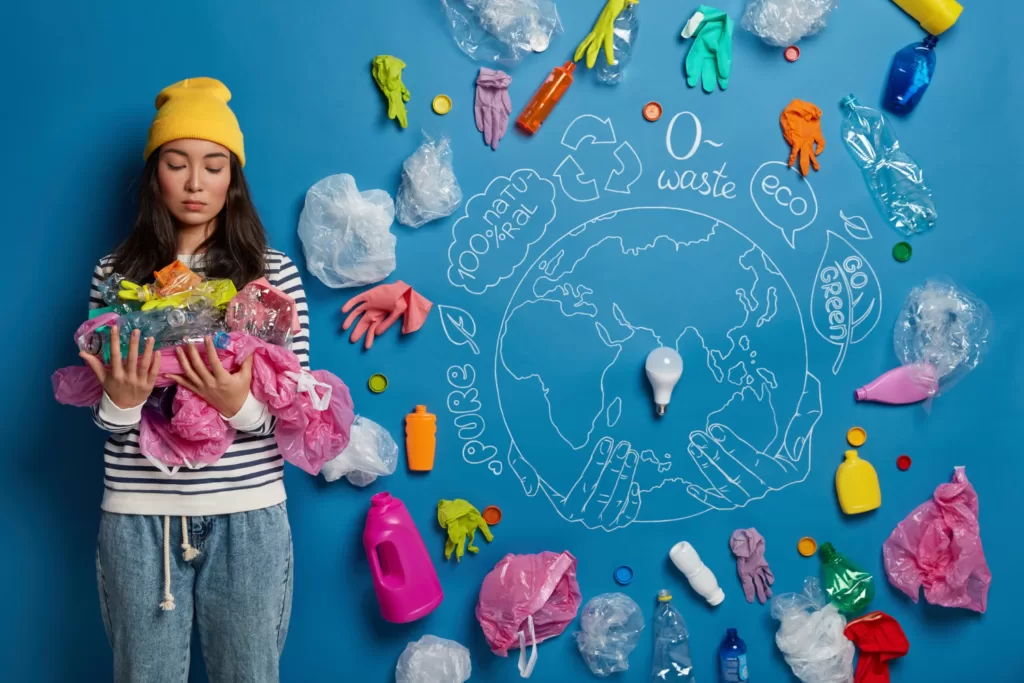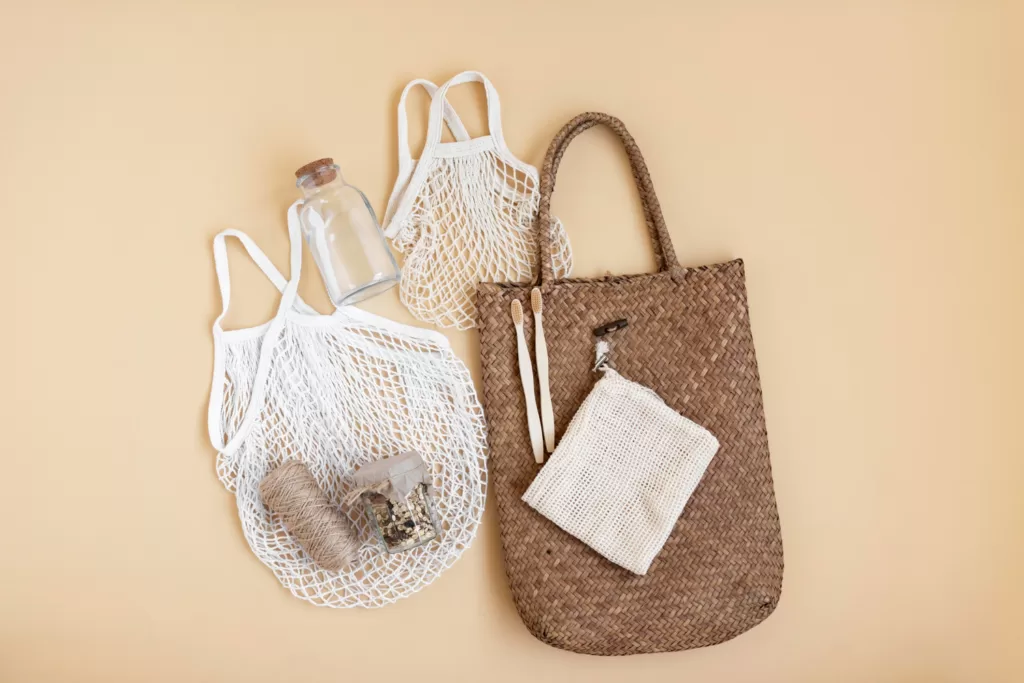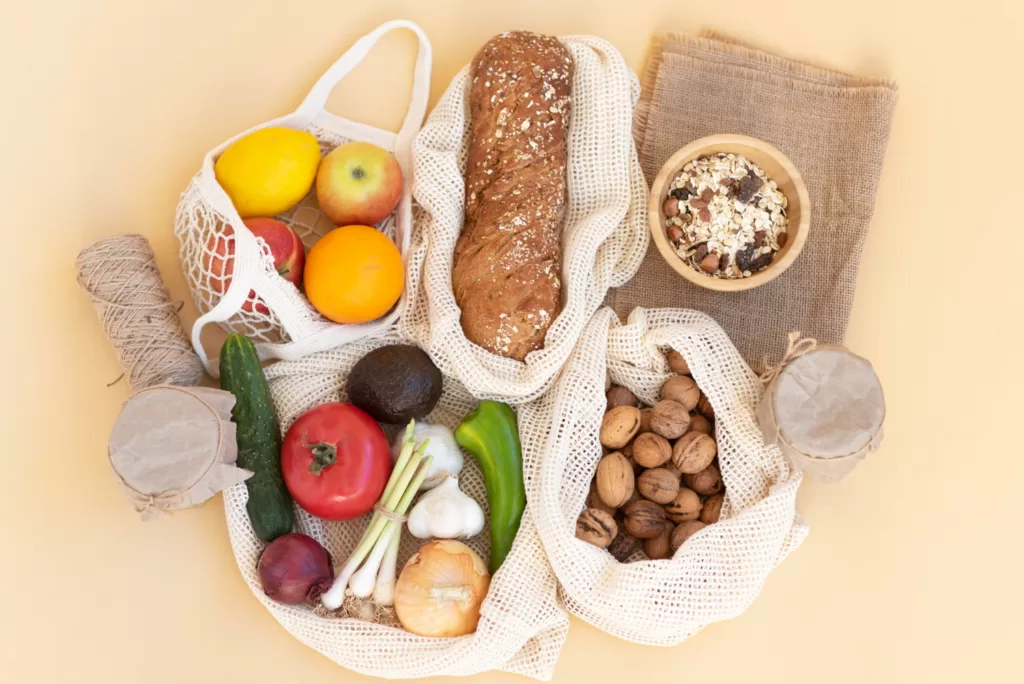In an era where environmental consciousness is gaining momentum, the need for sustainable alternatives to single-use plastic bags has become more evident than ever. Enter the rise of reusable shopping bags – an eco-friendly choice that is reshaping the way we approach daily errands and shopping trips. In this blog post, we will delve into the profound environmental impact of single-use plastic bags and explore the remarkable journey of reusable shopping bags, from their humble beginnings to their current position as a symbol of responsible consumption and environmental stewardship. Let’s discover the transformative power of reusable shopping bags and uncover practical tips to implement them effectively in our lives, creating a positive change for the planet, one bag at a time.
The Environmental Impact of Single-Use Plastic Bags

The convenience of single-use plastic bags has undoubtedly made them a staple in our daily lives. We encounter them at grocery stores, retail shops, take-out restaurants, and nearly every other place of business. However, the seemingly harmless convenience of these bags comes at a staggering cost to our environment and ecosystems.
Exponential Plastic Pollution
The pervasive use of single-use plastic bags has led to an alarming rise in plastic pollution. Each year, billions of these bags are consumed worldwide, and a significant portion of them end up discarded improperly. From urban streets to remote beaches, these non-biodegradable bags litter the landscape, marring the natural beauty of our planet.
Threat to Marine Life
The impact of plastic pollution on marine life is particularly heartbreaking. When plastic bags find their way into the oceans, they pose a grave threat to marine animals. Sea turtles, for instance, often mistake plastic bags for jellyfish and consume them, leading to suffocation and death. Additionally, marine birds and mammals can get entangled in these bags, causing injuries and hindering their ability to hunt and swim freely.
Persistent Plastic Waste
One of the most alarming aspects of single-use plastic bags is their longevity. These bags can take hundreds of years to decompose fully, releasing toxic chemicals into the environment as they break down into smaller microplastics. These microplastics can infiltrate soil, water sources, and even our food chain, posing health risks to humans and wildlife alike.
Energy and Resource Consumption
The production of single-use plastic bags demands significant amounts of energy and resources. From the extraction of fossil fuels for plastic production to the manufacturing processes and transportation, the environmental footprint of these bags extends far beyond their immediate use. Moreover, the short lifespan of single-use plastic bags means that these resources are quickly discarded, further exacerbating the problem.
Landfill Overflow
The disposal of plastic bags in landfills adds to the burden of waste management. As landfills continue to fill up with non-biodegradable plastic, the available space for other types of waste diminishes, leading to challenges in managing and reducing overall waste.
Climate Change Contribution
Plastic bag production and the ensuing pollution contribute to greenhouse gas emissions, contributing to climate change. As plastic waste breaks down, it releases methane, a potent greenhouse gas that has a significant impact on global warming.
The Rise of Reusable Shopping Bags

In recent years, a remarkable shift in consumer behavior and environmental consciousness has given rise to the popularity of reusable shopping bags. These eco-friendly alternatives have emerged as a symbol of responsible consumption and sustainability, gaining traction among individuals, businesses, and communities worldwide. Let’s explore the factors that have contributed to the exponential rise of reusable shopping bags and why they have become more than just a passing trend.
A Conscious Shift Towards Sustainability
As concerns about climate change, plastic pollution, and environmental degradation continue to escalate, people are seeking ways to reduce their ecological footprint. Reusable shopping bags have become a tangible and accessible choice for environmentally conscious consumers to actively participate in eco-friendly practices in their everyday lives.
Government Initiatives and Bans
Many governments and local authorities have recognized the urgency of tackling plastic pollution and have implemented policies to discourage the use of single-use plastic bags. By imposing bans or levying charges on plastic bags, these regulations have played a pivotal role in encouraging consumers to opt for reusable alternatives.
Promotion by Environmental Organizations
Environmental organizations and advocacy groups have been instrumental in raising awareness about the detrimental impact of plastic bags on the planet. Through educational campaigns and initiatives, they have highlighted the benefits of reusable bags and motivated individuals to adopt sustainable habits.
Retailer and Brand Endorsement
Forward-thinking retailers and brands have embraced reusable shopping bags as a means to showcase their commitment to sustainability. Many companies have started offering branded reusable bags to their customers, not only as a practical solution for shopping but also as a marketing strategy to promote their eco-friendly image.
Customizable and Stylish Designs
Reusable shopping bags have evolved beyond simple totes. With an array of customizable and stylish designs available, these bags have become fashionable accessories that people proudly carry. The ability to express personal style while making an environmentally conscious choice has contributed to their widespread appeal.
Growing Awareness of Ocean Pollution
The devastating impact of plastic pollution on marine life and ocean ecosystems has garnered significant media attention. Heart-wrenching images of marine animals entangled in plastic or ingesting harmful debris have motivated many individuals to take action and switch to reusable bags.
Social Media Influence
The power of social media cannot be underestimated. Influencers, celebrities, and eco-conscious activists use their platforms to advocate for sustainable living and often promote the use of reusable shopping bags. The viral nature of social media has helped amplify the message of environmental responsibility and inspired a broader audience to make the switch.
Incentives and Rewards
Various retailers and businesses offer incentives to customers who bring their reusable bags, such as discounts, loyalty points, or special rewards. These positive reinforcement strategies have motivated more people to adopt reusable bags as part of their shopping routine.
Making a Difference: Businesses Embracing Reusable Shopping Bags

It’s not just consumers who can contribute to a greener planet by using reusable shopping bags. Businesses can also play a crucial role in promoting sustainability and environmental responsibility.
Green Brand Image
By providing branded reusable shopping bags to their customers, businesses can showcase their commitment to environmental conservation. This eco-friendly initiative can enhance the company’s brand image and attract environmentally conscious consumers, ultimately boosting customer loyalty and sales.
Social Responsibility
Incorporating reusable shopping bags into business practices demonstrates a strong sense of social responsibility. It shows that the company is willing to take the extra step to minimize its environmental impact and protect the planet for future generations.
Engaging Marketing Strategy
Businesses can leverage reusable shopping bags as a part of their marketing strategy. These bags can be creatively designed with the company logo and relevant messages, serving as a walking advertisement every time customers use them. This marketing approach not only increases brand visibility but also spreads the message of sustainability to a wider audience.
Tips for Implementing Reusable Shopping Bags Effectively

Transitioning from the habit of using single-use plastic bags to reusable shopping bags is a simple yet powerful way to make a positive impact on the environment. To ensure a smooth and effective adoption of these eco-friendly alternatives, consider the following tips.
Start Small, Go Big
If you are new to using reusable shopping bags, begin with a single bag and gradually build a collection. Keep a foldable bag in your purse or backpack so that you’re always prepared for spontaneous shopping trips. As you become more comfortable, expand your collection to accommodate various shopping needs.
Keep Them Handy
Place reusable bags in easily accessible spots, such as by the front door, in the car, or near your keys. By keeping them within reach, you’ll be less likely to forget them when heading out to the store.
Diversify Your Collection
Invest in a variety of reusable shopping bags in different sizes and designs. Consider bags made from eco-friendly materials like organic cotton, jute, or recycled plastics. Having a diverse collection ensures you have the right bag for various shopping trips and errands.
Wash and Reuse
Regularly clean your reusable shopping bags to maintain hygiene and extend their lifespan. Cloth bags can be machine washed, while some sturdy materials may require handwashing. Proper care ensures they stay in good condition for many shopping trips to come.
Educate Others
Share the benefits of using reusable shopping bags with friends, family, and colleagues. Engaging in conversations about environmental responsibility and the impact of plastic bags can inspire others to make the switch as well, creating a positive ripple effect.
Bring Your Own Bag
Make it a habit to carry your reusable bag whenever you leave the house. By always having one on hand, you can decline single-use plastic bags offered at stores and markets, reducing your contribution to plastic waste.
Be Prepared for Bulk Shopping
If you plan on doing bulk shopping, ensure you have a few extra large reusable bags. These sturdy bags can comfortably hold heavier items without compromising on strength.
Repurpose Bags for Different Needs
Reusable shopping bags are versatile and can serve multiple purposes. Use them not only for grocery shopping but also for carrying books, gym clothes, or as an alternative to gift wrap.
Shop Mindfully
Be conscious of your purchases and try to avoid excessive packaging whenever possible. Opt for products with minimal or eco-friendly packaging, and use your reusable bags to carry them home.
Support Businesses with Green Initiatives
Choose to shop at businesses that actively promote sustainability and offer incentives for using reusable bags. By supporting environmentally responsible businesses, you contribute to the collective effort towards a greener future.
Teach Children about Eco-Friendly Practices
Educate the younger generation about the importance of reducing plastic waste and using reusable bags. Encouraging eco-friendly habits from a young age instills a sense of environmental responsibility that can last a lifetime.
Collaborate for a Cause
Businesses can make a greater impact by collaborating with environmental organizations or local charities. Consider donating a portion of the proceeds from reusable bag sales to support initiatives focused on environmental conservation.
Types Of Reusable Shopping Bags

As the demand for eco-friendly alternatives to single-use plastic bags continues to grow, a wide variety of reusable shopping bags have emerged in the market. These bags come in diverse materials, designs, and sizes, catering to different preferences and shopping needs. Here are some of the most popular types of reusable shopping bags available today:
Cotton Bags
Cotton bags are among the most common and versatile reusable shopping bags. Made from natural fibers, they are biodegradable and can be easily recycled. Cotton bags are lightweight, durable, and ideal for carrying groceries, books, and other everyday items. They often feature attractive prints and designs, adding a touch of style to eco-conscious shopping.
Jute Bags
Jute bags, also known as burlap bags, are made from natural jute fibers, making them an eco-friendly and sustainable choice. These bags are sturdy, capable of carrying heavy loads, and have excellent durability. Jute bags are an excellent option for grocery shopping, especially for items like fruits and vegetables.
Canvas Bags
Canvas bags are crafted from heavy-duty cotton or cotton-blend materials, providing exceptional strength and longevity. They are a popular choice for both shopping and carrying personal belongings. Canvas bags are often available in various sizes and can be customized with prints or slogans.
Recycled PET Bags
Recycled PET bags are made from post-consumer plastic bottles, diverting plastic waste from landfills and oceans. These bags are durable, lightweight, and water-resistant, making them suitable for various shopping and outdoor activities.
Hemp Bags
The fibers of the hemp plant, which are renowned for their durability and resilience, are used to make hemp bags. Hemp is an environmentally beneficial crop since it grows quickly, needs little water, and doesn’t need pesticides. Hemp bags are a strong, environmentally friendly solution for carrying large objects.
RPET Bags
RPET (Recycled Polyethylene Terephthalate) bags are created from recycled plastic materials, such as water bottles and food containers. By using recycled plastic, RPET bags help reduce plastic waste and lessen the demand for virgin materials. These bags are sturdy and often foldable, making them easy to carry on the go.
Nylon Bags
Nylon bags are lightweight and compact, making them convenient to carry in purses or pockets. They are often designed as foldable pouches, allowing users to easily store them when not in use. While nylon is a synthetic material, some companies offer nylon bags made from recycled materials.
Insulated Bags
Insulated reusable shopping bags are designed to keep perishable items fresh and hot or cold during transportation. They are an excellent choice for grocery shopping, picnics, and carrying food on the go.
String Bags
Also known as mesh or net bags, string bags are typically made from cotton, nylon, or organic materials. They have an open and flexible design, allowing them to stretch to accommodate varying sizes of items. String bags are lightweight and perfect for carrying produce and groceries.
Produce Bags
Produce bags are designed specifically for carrying fruits and vegetables. They are often made from mesh or organic cotton and can be washed and reused multiple times, reducing the need for plastic produce bags at grocery stores.
Conclusion
Reusable shopping bags are not just a trend but a necessary step towards a greener and more sustainable future. By transitioning from single-use plastic bags to reusable alternatives, we can significantly reduce plastic pollution, protect marine life, and minimize our carbon footprint. These bags offer unmatched versatility, durability, and cost-effectiveness, making them an ideal choice for both consumers and businesses.
Embracing reusable shopping bags is not just a one-time effort but a lifestyle change that can have a far-reaching positive impact. Businesses that adopt this eco-friendly approach can improve their brand image, engage in meaningful marketing, and showcase their commitment to environmental responsibility. Together, we can make a difference and create a world where reusable shopping bags become the norm, leaving a lasting legacy of sustainability for generations to come.
So, let’s take that first step towards a greener tomorrow – one reusable shopping bag at a time.
FAQs
Q: Why should I choose reusable shopping bags over single-use plastic bags?
A: Reusable shopping bags are a more sustainable choice as they can be used multiple times, significantly reducing plastic waste. By opting for reusable bags, you help protect the environment, support eco-friendly practices, and contribute to the reduction of plastic pollution in landfills and oceans.
Q: What are the best materials for reusable shopping bags?
A: Some of the best materials for reusable shopping bags include organic cotton, jute, hemp, recycled PET, and RPET. These materials are eco-friendly, biodegradable, and have a lower impact on the environment compared to single-use plastics.
Q: How do I clean and maintain my reusable shopping bags?
A: Cleaning reusable shopping bags is relatively easy. Cloth bags, such as cotton and canvas, can be machine washed with similar colors. Jute and hemp bags can be spot cleaned and air-dried. For recycled PET and RPET bags, follow the manufacturer’s instructions for cleaning. Regular maintenance and proper storage ensure the longevity of your reusable bags.
Q: Can reusable shopping bags replace all types of plastic bags?
A: While reusable shopping bags are versatile and can replace many types of plastic bags, they may not be suitable for certain specialized purposes, such as storing raw meat or liquids. However, they can effectively replace single-use plastic bags for everyday shopping needs and general carrying purposes.
Q: Are there any benefits for businesses in offering reusable shopping bags to customers?
A: Yes, offering reusable shopping bags to customers can benefit businesses in several ways. It showcases the company’s commitment to environmental responsibility, improving the brand image among environmentally conscious consumers. Additionally, branded reusable bags can serve as effective marketing tools, increasing brand visibility and customer loyalty. Many businesses also offer incentives for customers who bring their reusable bags, further promoting sustainable practices.

1 thought on “Reusable Shopping Bags: Paving the Way for a Plastic-Free Planet”